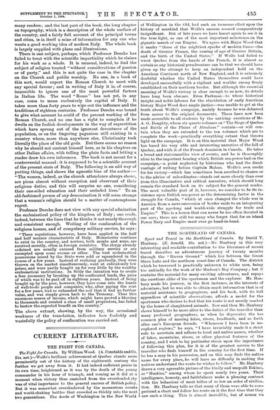The Fight for Canada. By William Wood. (A. Constable and
Co. 21s. net.)—Wolfe's brilliant achievement at Quebec stands more prominently out of the history of the eighteenth century the further we get away from it. It had indeed sufficient praise in its own time, heightened as it was by the death of the young commander in his hour of triumph, and coming as it did at a moment when victory thus snatched from the overclouded sky was of vital importance to the general success of British policy. But it was somewhat overshadowed by the momentous events and world-shaking battles that crowded so thickly into the next two generations. The deeds of Washington in the New World of Wellington in the Old, had such an immense effect upon the history of mankind that Wolfe's success seemed comparatively insignificant. But of late years we have learnt again to see it in the true light, as one of the most important milestones on the gigantic march of our Empire. We agree with Major Wood that it marks "three of the mightiest epochs of modern times—the death of Greater France, the coming of age of Greater Britain, and the birth of the United States." If Wolfe had failed to wrest Quebec from the hands of the French, it is almost as certain as any historical peradventure can be that we should have given up the attempt to keep an independent hold on the American Continent north of New England, and it is extremely doubtful whether the United States themselves could have developed successfully with a vigilant and warlike enemy firmly established on their northern border. But although the essential meaning of Wolfe's victory is clear enough to us now, its details have long been obscure. Even Parkman—to whose historical insight and noble labours for the elucidation of early American history Major Wood does ample justice—was unable to get at the truth about Wolfe's campaign, mainly because he was debarred from access to the original documents. These have now been made accessible to all students by the untiring exertions of Mr. A. G. Doughty, whose six quarto volumes on "The Siege of Quebec and Battle of the Plains of Abraham" contain—or will con- tain when they are extended to the ten volumes which are to complete the work—practically everything extant that throws light on the campaign. It is on this material that Major Wood has based his very able and interesting narrative of the fan of Quebec, and with it of the French dominion in Canada. He takes a broad and statesmanlike view of events, and be is thoroughly alive to the important bearing which British sea-power had on the campaign,—a point neglected by historians who had the disad- vantage of writing before Captain Mahan. Wolfe's own credit for his victory—which has sometimes been ascribed to chance or to the advice of subordinates—stands out more clearly than ever from this illuminative and critical narrative, which should long remain the standard book on its subject for the general reader. The most valuable part of it, however, we consider to be its in- sistence upon British sea-power as the determining factor in the struggle for Canada, "which at once changed the whole war in America from a mere succession of border raids to an integrating part of the age-long and world-wide struggle for trade and Empire." This is a lesson that can never be too often iterated in our ears; there are still too many who forget that for an island Power Navy and Empire must ever go hand-in-hand.






















































 Previous page
Previous page